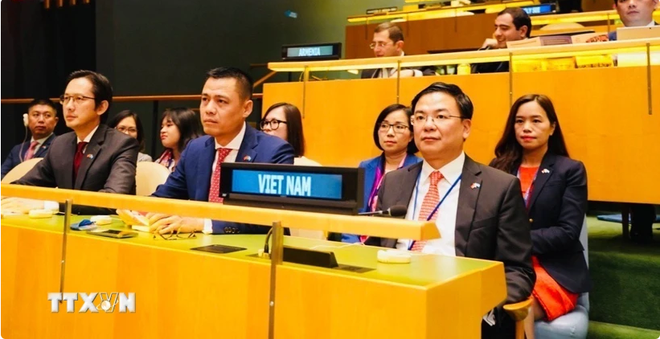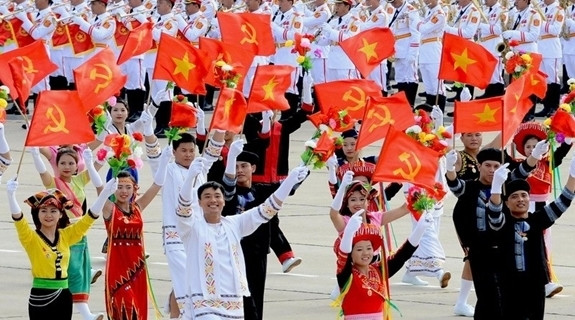
Hanoi (VNA) – From the first time Vietnam was elected to the United Nations Human Rights Council in 2013 until February 26, 2024 when the country announced that it will run for a seat at the council again for the 2026 - 2028 tenure and called for international support, hostile organisations tried every trick to get in Vietnam's way.
Recently, on October 3, 2023, the Human Rights Watch (HRW) called on Vietnam to urgently reform human rights before the universal periodic review (UPR) cycle without any accurate foundation and arguments but information collected from sources of discontent and opposing elements, individuals, and organisations in the country.
On January 11, HRW released its annual report on human rights practices in more than 100 countries in 2023, in which it used the one-sided word "gloomy" when making comments on the human rights situation in Vietnam.
Denying this report, the Foreign Ministry’s spokeswoman Pham Thu Hang emphasised that Vietnam rejects and condemns the so-called HRW for its report with fabricated and false content.

It is not the first time this organisation had presented biased allegations with malicious intent against Vietnam, aiming to undermine the country’s socioeconomic development and sow discord between Vietnam and the international community, she noted.
It can be foreseen that from now until September 2024 when the UN Human Rights Council approves the UPR during its 57th regular session, there will be many reactionary organisations taking actions to hinder Vietnam in its journey to assert itself in the world arena.
But, in fact, the obvious efforts and achievements that Vietnam has shown in ensuring human rights have been recognised by the international community, as evidenced by UN member states’ electing of Vietnam as a member of the UN Human Rights Council twice in the 2014-2016 and 2023-2025 tenures.
Meanwhile, hostile and reactionary forces have set up so-called "prisoners of conscience", "injustice citizens", and "democracy activists" to turn law violators into "patriotic soldiers", hoping on the one hand to deceive public opinion and on the other hand facilitate the conduct of fundraising campaigns, with the money mainly falling into the pockets of illegal campaigners and reactionary groups and organisations such as Women's Human Rights Association, Free Citizens Group, Patriotic Youth Group and Vietnam Reform Revolutionary Party (Viet Tan).

For example, over the years, Viet Tan has raised money at home and abroad to support the awarding of the "Tran Van Ba Spirit Award" to "prisoners of conscience" and "democracy activists". Viet Tan has collected hundreds of millions of dong and thousands of US dollars, but the number of people who receive money from Viet Tan can be counted on the fingers of one hand, with the highest prize being only a few hundred dollars. So where did the money donated at home and abroad go?
Hostile and reactionary forces have used the guise of democracy and human rights, while rummaging shortcomings in management and administration activities, especially in ethnic minority-inhabited areas, to entice and incite people to participate in protest activities, disrupting security and order, and causing riots to destabilise politics, society, security and order in Vietnam, and harming confidence in the Party and State.
In the attack to the communal People’s Committee headquarters in Dak Lak on June 11, 2023, one of the attackers, Y Chanh Nie, a resident of Krong Buk district, confessed that he “acted following the seducers and leaders who promised me a prosperous and wealthy life". Gullibility, greed and ignorance caused Y Chanh Nie to receive a life sentence for engaging in "terrorism against the people's administration".
Another plot that hostile and reactionary forces often use when slandering Vietnam of violating basic human rights and oppressing so-called "dissidents" is to use democracy and human rights as bargaining conditions. For years, every May (most recently May 11, 2023), US Congressman Chris Smith has introduced the so-called "Vietnam Human Rights Act" to force his country’s Department of State to place human rights issues in relations with negotiations with Vietnam. This is clearly a blatant intervention in Vietnam's internal affairs, not only going against the development trend in relations between Vietnam and the US, but also going against the principle of respecting the right to national self-determination in contemporary international relations recognised by the UN Charter. That's why the so-called "Vietnam Human Rights Act" has never been passed by both houses of the US Congress for the US President to sign into law.

Moreover, hostile and reactionary forces also take advantage of the fact that the European Union (EU) and some Western countries passed bills, resolutions, and annual reports with content that distorts the democratic and human rights situation in Vietnam to falsely accuse Vietnam of democracy and human rights violation and religious persecution, aiming to make the international community misunderstand the situation in the country. However, the fact that Vietnam was twice elected as a member of the UN Human Rights Council with a very high number of votes, according to Gérard Daviot, former President of the France-Vietnam Friendship Association (AAFV), is the result of "a whole journey that has been outlined and successfully implemented by Vietnam", which is "a worldwide recognition" and the fact that "Vietnam has become one of the countries honoured by the world for human rights.”
Vietnam's human rights achievements have been recognised by the international community and Vietnam has always been open and straightforward in mentioning difficulties related to human rights and its efforts to seek solutions for improvement. With the approach of taking "people as the centre, the subject, the main resource and the goal of development", Vietnam will continue to reap new achievements. Conspiracies and plots of hostile and reactionary forces will certainly fail.
Every country has its own rule, and all citizens are equal before the law and obliged to live and work in respect of the law. Compatible with the provisions of international law, the 2013 Constitution of Vietnam clarifies that human rights and citizens’ rights may not be limited unless prescribed by a law solely in case of necessity for reasons of national defence, national security, social order and safety, social morality and community well-being.
As Vietnamese people are becoming more and more knowledgeable today, they can equip themselves with the ability to be "immune" to harmful information, especially reactionary information that distorts the country's situation on social networks. Plots against Vietnam, whether they are from within or outside, will sooner or later fail in the face of the unshakable spirit of national solidarity and the desire to build a prosperous and happy country which ensures that "people know, people discuss, people do, people check, people supervise, and people benefit".
In his recent article, Party General Secretary Nguyen Phu Trong humbly and proudly reiterated that "Our country has never had the fortune, potential, position and international reputation it has today." That is an undeniable fact.
Images of US President Barak Obama enjoying “bun cha” in Hanoi, Australian Prime Minister Malcolm Turnbull eating “banh mi” on the sidewalk of Da Nang, Canadian Prime Minister Justin Trudeau drinking coffee on the sidewalk of Ho Chi Minh City, and Dutch Prime Minister Mark Rutte enjoying tea in Hanoi are stronger proof than a thousand words to describe a peaceful and hospitable Vietnam.
Therefore, although the risks of sabotage are always lurking, Vietnam is confident and determined to develop the country following the chosen path, taking the people as the root, the centre and the subject of the cause of reform, construction and defence of the Fatherland./.




























